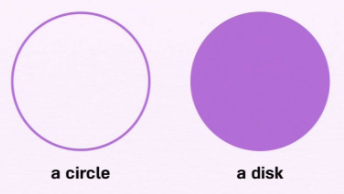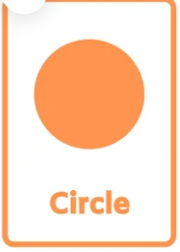Mathematics, as any other field of inquiry, has specific terminology. The rest of the world is not obliged to use the same technical terminology.
Note that this also happens within mathematics; not every subfield is interested in the same issues and sees the same distinctions as important.
In particular, for young children, the relevant thing to learn is the names of basic figures, together with names of colours, and so on. The minute difference between a circle and a disk is not relevant for a number of years. (Why minute: you have a one-to-one correspondence, so identifying them with each other is quite reasonable for many purposes, even for a professional mathematician. It is usually clear which one we are talking about.)

